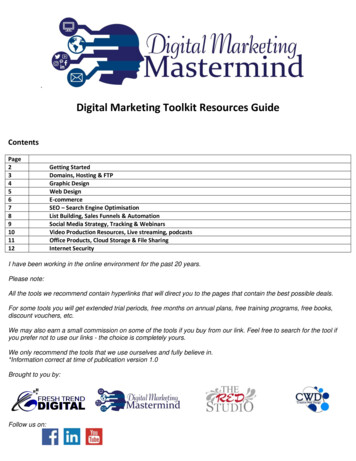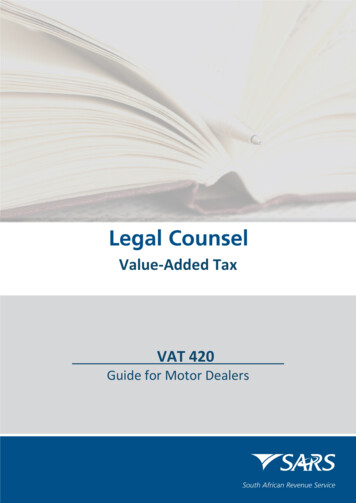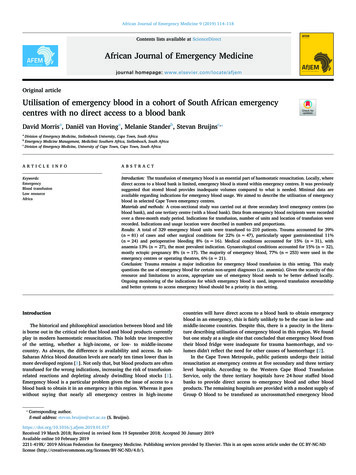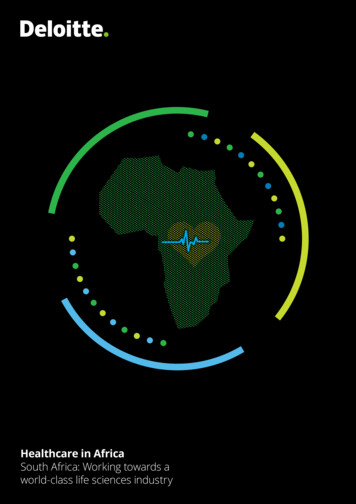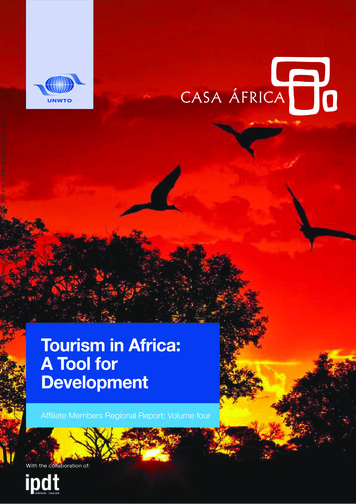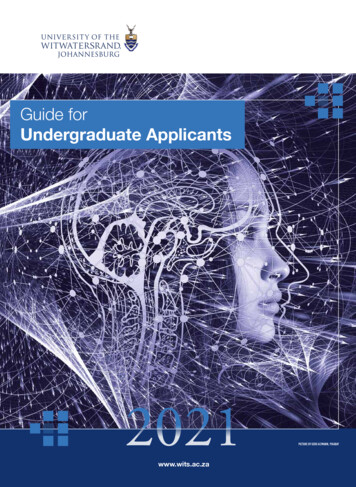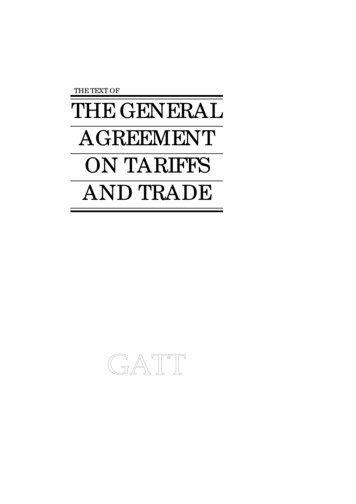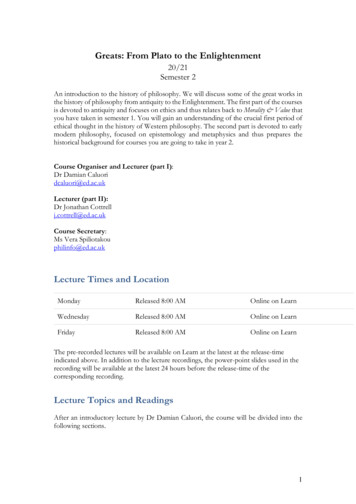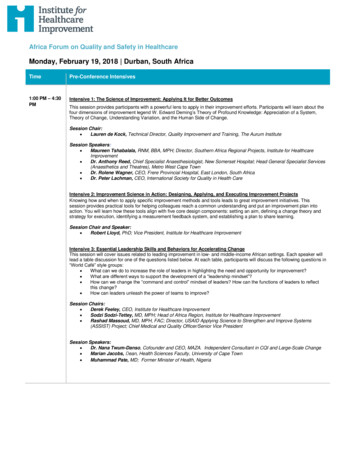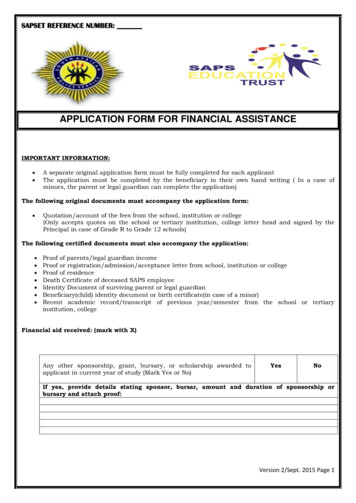
Transcription
SAFLII Note: Certain personal/private details of parties or witnesses have been redacted from thisdocument in compliance with the law and SAFLIIPolicyREPUBLIC OF SOUTH AFRICAIN THE HIGH COURT OF SOUTH AFRICA(GAUTENG DIVISION, PRETORIA)CASE NO:27970/2011DATE: 12 JUNE 2014NOT REPORTABLENOT OF INTEREST TO OTHER JUDGESIn the matter between:CREATEN VALOYI.PLAINTIFFandABSA IDIRECT LIMITED.DEFENDANTJUDGMENTKUBUSHI, J[1] The plaintiffs claim is based on the defendant’s breach of an insurance contract in repudiating his claimand failing to compensate him the amount of R297 990 as a sum covered for his motor vehicle. In hisparticulars of claim, the plaintiff alleged that on the 13 July 2010 the parties entered into a written insuranceagreement which covered risk in respect of the plaintiffs BMW 525i motor vehicle with registration numberZ[.]. The motor vehicle was insured for R297 990. The plaintiff alleged also that he complied with the termsof the agreement which required him to pay monthly premiums of R2112.98, however the defendantrepudiated his claim which he lodged as a result of his motor vehicle being involved in an accident and was
damaged beyond repairs.[2] The defendant in its defence to the plaintiffs claim pleaded that it is the plaintiff who breached the termsof the insurance agreement in that he failed to disclose to the defendant that his previous insurance policy inrespect of the BMW 330i motor vehicle was cancelled as a result of the previous insurer of the motor vehiclefinding that he (the plaintiff) had an unacceptably high risk. The defendant also alleged that the plaintiffbreached the terms of the agreement in that he (the plaintiff) misrepresented to the defendant that hisprevious policy did not come into being as a result of a high insurance risk profile. The defendant furtheraverred that the non-disclosure as well as the misrepresentation by the plaintiff was material in that it had adirect bearing on the risk assessment it conducted in respect of the motor vehicle covered. Had the plaintiffdisclosed the fact that his previous insurer had cancelled the policy due to an unacceptable risk, the defendantwould not have entered into an agreement of insurance with the plaintiff on the terms it did and as such it wasentitled to repudiate the claim.[3] Before the commencement of the trial the defendant’s counsel handed in a bundle of documents that weresubpoenaed from Outsurance - the employer of the plaintiff, which according to him simply goes to the factof the plaintiffs knowledge of the insurance industry. The plaintiffs counsel did not object to the documentsbeing handed in. He, however, submitted that the documents were irrelevant for purposes of this trial. Heindicated as well that he will during evidence object to any document which he may consider irrelevantshould such document be referred to during evidence. At the end of trial I found the documents irrelevant forneither counsel referred to them during the course of the trial.[4] Amongst the documents discovered there were two bundles of documents. Bundle “C” and Bundle “D”,which were mostly referred to by the parties’ counsel during evidence and which formed the basis on whichthe parties relied for their respective cases. Bundle “C” is the transcript of the conversation over the phonebetween the plaintiff and Telesure’s claims specialist and Bundle “D” is the transcript of the conversationover the phone between the plaintiff and the defendant's sales consultant.[5] The plaintiff testified for himself and called no other witness. To the contrary the defendant tendered theevidence of three witnesses, namely Siyabonga Mthunzi Maphalaga (Maphalaga) a manager in the claimsdepartment at Outsurance; Loius Meyer (Meyer), an employee of Telesure Group (Pty) Ltd (Telesure), whowas at the material time in question employed as a customer relations specialist; and Thandeba Bhengu(Bhengu) employed by Absa iDirect (the defendant) as a loss adjustor. Although reference is made toTelesure in this judgment, sight should however not be lost that the plaintiffs BMW 330i motor vehicle wascovered by Auto and General. Telesure Group is an umbrella company of insurance companies like BudgetOutsurance, Dial Direct First for Women and Auto and General is a part of that group.
[6] I was also informed by the defendant’s counsel that the defendant had tried to subpoena Ms Selemela thesales consultant who was at the material time in question in its employ and who assisted the plaintiff at thetime of the conclusion of the insurance agreement but she was untraceable. A copy of her attemptedsubpoena was handed in court.[7] At the beginning of the trial the parties were common cause that the defendant repudiated the plaintiff’sclaim. They were also in agreement that the issues in dispute which this court had to determine were: whetherthe plaintiff disclosed all the material facts to the defendant; and whether the plaintiff misrepresented facts tothe defendant.[8] It is trite that insurance policies are contracts uberrimae fidei and this casts upon the insured, or strictlythe proponent for insurance, the duty to disclose to the insurer, before the conclusion of the contract, all factsmaterial to the risk which are known to the insured. The purpose of this rule is to enable the insurer to beapprised of all material facts relevant to his or her decision whether to undertake the risk and, if so, whatpremium to charge. The rationale of the rule is that the special facts upon which risk is to be computedgenerally lie in the knowledge of the insured only. This duty to disclose exists in addition to the insured'sobligation to answer truthfully all questions put to him or her by the company in the proposal form. Failureby the insured to make such disclosure entitles the insurer to avoid the contract of insurance. See Pereira vMarine and Trade insurance Co, Ltd.1[9] In short, the plaintiffs evidence is that he is in court on the basis that his insurance contract has beenbreached. He was insured by Absa iDirect, for his BMW 525i motor vehicle. He took out the insurance inJuly 2010. He was provided with a quotation on 13 July 2010. The quotation was accepted on 28 July 2010.The negotiations and conclusion of the insurance agreement was done over the phone. In 2011 he wasinvolved in a motor vehicle accident and the insurance refused to pay out the claim. Absa iDirect refused topay his claim because it was alleged that he did not tell them that Auto and General cancelled his policy inrespect of the BMW330i.[10] He previously had a BMW 330i motor vehicle that was insured by General Insurance Ltd (Auto andGeneral). He had taken out two insurance policies underwritten by Auto and General. The first insurance wasunder policy number 5[.] for home contents cover effective from 29 September 2008 and cancelled from 10March 2009. He was provided with a letter of cancellation of this policy. The contract was cancelled by Autoand General at his request The second policy was for his BMW 330i. They were robbed at the house wherehe together with his wife was shot and the motor vehicle hijacked. The claim for the motor vehicle was paidout. After Auto and General paid the claim for the BMW 330i, they refused to register him for another motorvehicle. He asked for a quotation but they refused to provide it. The manager at Auto and General informedhim that they cannot accept his quotation because the motor vehicle that he was driving was high risk. He
asked for a letter to show that they will not insure him because he did not understand why they would notinsure him. He was then told that the insurance company that will insure him should phone them for anyfurther information because there is no letter that can be given to him. He then bought another motor vehicle,the BMW 5251 which is the subject matter of these proceedings.[11] According to him there were no facts material and relevant to the agreement which were known to himat the time of the conclusion of the contract which he did not tell the consultant of Absa iDirect over thephone. He did not misrepresent any fact to the Absa iDirect consultant He told her the whole truth. He toldher that he was insured by Telesure and explained to her the reasons why Telesure refused to insure him. Hegave her permission to contact Telesure. The lady from Absa iDirect called him two weeks after she gavehim the quotation to find out whether he was still interested to proceed with the insurance. As such he wasunder the impression that she had phoned Telesure to ascertain the reason for the cancellation.[12] On the converse, the defendant’s testimony is that it was advised by Telesure that the plaintiffs previousinsurance with them was cancelled due to unacceptable risk. As the plaintiff did not disclose that he wasrefused cover due to unacceptable risk but because his motor vehicles were high risk the defendant had torepudiate the claim. The defendant accepted to cover the plaintiffs motor vehicle on the basis of themisleading information he provided. The information given at sale stage, according to Bhengu is taken ingood faith and accepted as true and correct there is therefore no need to verify it. This is the practice in theinsurance industry; verification is done only at the time of lodgement of a claim. Meyer from Telesureconfirmed in his testimony that the plaintiff was cancelled because he was a moral risk which is the same asunacceptable high risk. According to him, Telesure believed that the plaintiff would lie to them and put inillicit and fraudulent claims - that is why they cancelled.DID THE PLAINTIFF DISCLOSE THAT HIS POLICV WITH TELESURE WAS CANCELLED?[13] It is common cause that the defendant learn't from Telesure that the plaintiffs previous insurance policywas cancelled as a result of Telesure finding that the plaintiff had an unacceptably high risk. This wasdiscovered at the time that the defendant was investigating the plaintiffs claim, which is a norm within theinsurance industry. This was confirmed by Meyer in his testimony confirmed that the plaintiffs policy withTelesure was cancelled because the plaintiff was profiled as unacceptably high risk.[14] The defendant’s counsel when cross examining the plaintiff challenged the plaintiffs testimony in that he(the plaintiff) did not inform the defendant that his insurance with Telesure was cancelled. The plaintiff wasput to task about a response which he gave to the defendant’s sales consultant. That response was recorded as“Ja, okay” coupled with an explanation. According to the defendant’s counsel, this was not a reply acceptingthat the policy with Telesure was cancelled but simply words the plaintiff used to start a conversation. This
challenge to me was a non-issue because this was not the defendant’s case. In its pleadings the defendant’sdefence is that the plaintiff failed to disclose that his insurance agreement with Telesure was cancelledbecause of unacceptably high risk. The issue raised by the defendant in his defence was not that the plaintifffailed to disclose that the policy was cancelled, but that he did not disclose that the policy was cancelled dueto his classification as unacceptable high risk. I would therefore move from the basis that failure todisclose cancellation was not in issue and to accept the plaintiff evidence that he did disclose to the defendantthat Telesure had informed him that the agreement was cancelled.DID THE PLAINTIFF DISCLOSE THAT HIS POLICV WITH TELESURE WAS CANCELLED DUE TOUNACCEPTABLE HIGH RISK[15] It is also common cause that Telesure cancelled the plaintiffs policy because of his profile asunacceptably high risk. It is also not in dispute that Telesure did not provide the plaintiff with a lettercancelling its agreement with him. The plaintiffs testimony was that Telesure did not advise him that theycancelled because of unacceptable high risk. He also testified that he did not understand the reason whyTelesure cancelled his policy or refused to cover him further. The plaintiffs further testimony is that althoughhe asked Telesure to provide him with a cancellation letter, the claims specialist refused to give him theletter. The letter could have, in my view, assisted to easily determine whether or not the plaintiff wasinformed of the reason why his policy with Telesure was cancelled. In order to ascertain whether or notTelesure informed the plaintiff about the reason why the policy was cancelled, the parties relied on theconversation between the plaintiff and the Telesure’s claims specialist the transcript of which as alreadystated was in Bundle WC’\ The relevant part of that conversation is recorded as follows:“C-ClientS - Claims SpecialistC- NOT A PROBLEMS - OK MR VALOYI ANYTHING ELSE THAT I CAN ASSIST U WITH?C - THERE'S THE THING OF, OF INSURANCE WHAT I WANT, BECAUSE I DO NOT HAVE TO- I DON'T KNOW WHO TO SPEAK TO ABOUT IT.S- MMMC- BECAUSE IF, IF ITM MIGHT BE RIGHT - ITS - ITS NOT SOMETHING THAT LIKE, I WILL
DO ON INTENTION. HE ‘FUCK’ IT UP TOTAL THERE WAS SOMEONE IN THE CALLCENTRES- MMMC - AND FOR ME TO BE DENIED INSURANCE LIKE THAT CAUSE WHEN I SPEAK TO YOU, ISAID I HAD A WISH I WAS GONNA KEEP MY CAR AND PAY INSURANCE.S - MMM. MMM OK. OK ITS THE SAME SCENARIO IF A PERSON - UHM - IS A BUSINESSOWNER THEN DRIVES IT FROM CUENT TO CUENT AND DUE TO THE . THE AREA THATHE IS DRIVING IN HE’SBEEN IN A LOT OF ACCIDENTS AND THE RISK IS BECOMING TOO HIGH OR A PERSONWHO STAYS IN A COAST AND BECAUSE OF.,. (CELL PHONE RINGTONE.)C- SO. NOW I.S - IF ITS CIRCUMSTANCES OUT OF HIS CONTROL HE DIDN’T ASK FOR IT DIDNT WISHFOR IT BUT STILL WE AS THE INSURANCE COMPANY HAYE A RIGHT TO DECIDE AREYOU GOING TO BE HIGH RISK OR NOT, SO - WE LOOKED AT YOUR AGE. WE LOOKED ATTHE TYPE OF VEHICLE THAT YOU ARE, YOU ARE DRIVING AND WE MADE IT EFFICIENTTHAT THE, THE PERSON ITSELF NOT THE CIRCUMSTANCES BUT YOU, AS YOUR AGEAND THE VEHICLE THAT YOU ARE DRIVING IS TOO HIGH A RISK WE CANT TAKE IT WEARE NOT WILLING TO TAKE THAT RISK.C - SO EVEN IF I SELL IT & MOVE. MOVE WHERE I AM STAYING.S- IT'S WHAT?C - I AM MOVING WHERE I AM STAYING NOW.S - ITS NOT ABOUT YOUR AREA ALSO SIR YES IT IS ABOUT YOUR SECURITY SY5TEM.JUST KNOW WHAT THE CRITERIA IS, ITS NOT ALWAYS JUST DUE TO THE PHYSICALAREA THAT YOU STAY IN, ITS ALSO TO DO WITH THE PERSON THAT DRIVES THEVEHICLE, THE AREA THERE IS A LOT OF STUFF WHICH IS NCB DEPENDANT EVERYTHING THEY HAVE AT ON NCB THE END OF THE DAY TO BE ACCEPTABLE FORUS TO INSURE YOUR YEHICLE. BUT THERE'S A LOT OF OTHER INSURANCE COMPANIESMR VALOYI.
C- BUT WHAT I AM SAYING IS.S- MMMC - CAN YOU, CAN I GET NCB LETTER JUST TO SAY THAT BECAUSE, SHOULD I SHOULD IWANT TO CHOOSE WHY YOU GUYS HAYE. CAN I BE LIKE, CAN I CHOOSE THE LETTERTHAT, THAT IS THE REASON, NOT BECAUSE I'M THE BAD PERSON OR ANYTHING BUTBECAUSE THE CARS THAT I’M DRIVING?S - MMM SIR, NO THEY CAN PHONE US, THEY CAN PHONE US AND ASK THAT SO.C - ITS NOTED AS UNACCEPTABLE RISKS- ITS NOTED AS UNACCEPTABLE RISKC - IS IT?S - SO YOU, YOU, YOU KNOW WHAT DID U HAVE TO DO AND THATS ONLY MY OPINION.WHEN YOU GET NEW INSURANCE BY SAY FOR ARGUMENT SAKE FOR INSTANCEOUTSURANCE, TELL THEM LISTEN MY INSURANCE COMPANY CANCELLED MY POLICYAGAIN DUE TO THE FACT THAT UHM . THE TYPE OF VEHICLE & MY AGE - IS TOOHIGH A RISK FOR THEM TO CARRY - MY INSURANCE WAS NOT CANCELLED DUE TOFRAUD - THERE IS A DIFFERENCE BETWEEN FRAUD DUE ON TO HIGHER RISK OR UHM. THE, THE USE OF THE VEHICLE ITS THE SAME SCENARIO YOU TOLD NICO’S THATYOU FIRST WANTED TO GET A QUOTE FOR THE JAG THROUGH OUTSURANCE ANDTHEY GAVE YOU EXACTLY THE SAME ANSWERC-I GET YOUS-ON TOO HIGH A RISK AND YOU DID NOT SAY THAT TO USC-NOT REALLY BEING DUE TO HIGH RISK BUT IT WAS UHM. A HIGH RISK MUSTBE A LOT LOWERS-LOWERC-YES MA’MS-ABSOLUTELY
C-WHERE THEY GONNA GIVE ME PREMIUM, IF I DON’T GET IT FROM YOU, WHERESHALL I BE GETTING A PREMIUM FOR R97 000-00 OF WHICH I ‘M NOT WILLING TO PAYTHAT AMOUNTS- JAC - ITS NOT LIKE YOU GUYS GAVE ME HIGH PREMIUM BUT YOU TELL ME YOU CANTINSURE MES-JAC-THATS ALLS-JA. YOU ARE UNACCEPTABLE RISKC-JAS-NOT YOUC-BUT I KNOW ITS UHM. MY CAR IS UNACCEPTABLE RISKS-OK, OK SO WHEN ARE YOU COLLECTING YOUR NEW VEHICLE, WELL YOU BEDRIVING YOUR YEHICLE WITHOUT AN INSURANCE NOW? AS THIS IS WHAT IS GOINGTO HAPPEN?C - THAT’S, THAT’S WHAT I’M HEARING FROM YOU BECAUSE I WAS WILLING TO . TOINSURE MY VEHICLE WITH YOU GUYS, THAT I GET ALL THE REQUIREMENTS BUT, ITSNOT BECAUSE I’M GETTING A 525S - SO YOU DIDN'T GET A QUOTATION FOR A RANGE ROVER NOW AS I UNDERSTAND C NO I WAS JUST WEIGHING OPTIONS 5- WEIGHING OPTIONS?C- YES, LIKE SEE IF I GET THIS CAR HOW MUCH IS WILL THE INSURANCE BE, I MUSTBUY SOMETHING CHEAPER INSURANCE WISE, ÍT WILL HELP ME . BUY A CHEAP CARAND THEN I DON’T GET INSURANCE SHOULD I GET AN ACCIDENT I WILL HAYE COVERS-ABSOLUTELYC-S NOW I AM BUYING A 5 SERIES
S- OH OKC-JA STILL YOU GUYS WONT INSURE MES - NO ITS A BIG CALL, WHY DO YOU BUY A 5 SERIES? ITS A VERY BIG CARC-NO THAT ONE IS NICE, IS A FACT I HAVE A LITTLE BOYS- OHC- I NEED A BIGGER CARS- OH OKC- YESS- THE VOLVO ITS ALSO A SAFE CAR ALSO A BIG CARC- VOLVO IS NOT MY STYLES- IS NOT YOUR STYLE?C- JAS - OH OK, AND THE DODGE?C - THE DODGE YOU KNOW WHAT I WANT FROM A CAR? I WANT COMFORT AND THEUHM THE JAGUAR HAD THE COMFORT BUT UNFORTUNATE IT HAD PROBLEMS WITHTHE MECHANICALS- MMMC- JAS- OK IT ALL DEPENDS AND GOOD LUCK MR VALOYI, IF THERE’S ANYTHING ELSEYOU’RE INTERESTED VOU CAN PHONE MEC- OK”[16] In his evidence, the plaintiff wanted this court to believe that Telesure did not inform him about thereason his policy was cancelled. It is, however, apparent from this conversation that the plaintiff was advised
and he knew that his policy with Telesure had been cancelled and that Telesure was no longer prepared toinsure him further. It is also clear from the conversation that the plaintiff was told and he was aware that thecancellation was as a result of unacceptable risk. The difficulty however is that the claims specialist did notproperly explain to him what the concept of unacceptable risk entailed. From the conversation it appears thatthe explanation given to the plaintiff was that Telesure considered his age and the motor vehicle he wasdriving in order to conclude that the risk was unacceptably high. She also explained the risk involved to meanhigh risk. For example, she informed the plaintiff that the insurance company has a right to decide whetherhe was going to be high risk or not; and in doing so they looked at his age and the type of vehicle that he wasdriving and they made it efficient [sic!] that the person and not the circumstances, but him, because of his ageand the motor vehicle that he was driving was too high a risk and they were not willing to take that risk.[17] There were also times where the claims specialist referred to the risk involved as high risk. For instance,she advised the plaintiff to tell a company which would want to insure him that his insurance companycancelled his policy due to the fact that the type of vehicle and his age were too high a risk for them to carryand that his insurance was not cancelled due to fraud. He also advised him that there was a differencebetween fraud due to higher risk and the use of the motor vehicle. The two went on to discuss different typesof motor vehicles which in my opinion could have left one with an impression that what was considered wasthe type of motor vehicle which caused the risk to be high, rather than the person. It is my view that theclaims specialist left the plaintiff with an impression that Telesure did not want to insure him further becausethe type of motor vehicle he was driving was unacceptable high risk.[18] Another challenge by the defendant was that the plaintiff ought to have known what Telesure meant by‘unacceptably high risk’ as he was employed within the insurance industry. It is common cause that at thetime the plaintiff entered into an agreement with Telesure for insurance cover he was employed withOutsurance as a claims advisor. He had been so employed for a period of four years. However, from theevidence he gave in court it was clear that the plaintiff did not understand what unacceptable risk was. Hisexplanation was that unacceptable risk and high risk were the same and were in respect of the item to beinsured. On the other hand the other more clued up persons in the insurance industry, Maphalanga, Meyerand Bhengu differentiated between unacceptable risk and high risk. According to their evidence unacceptablehigh risk pertained to the person of the client whilst high risk was in respect of the item covered by theinsurance.[19] The plaintiffs evidence was corroborated by that of Maphalanga. At the time when he testified,Maphalanga, was an employee of Outsurance where the plaintiff was also employed. He was employed in theclaims department as a motor claims manager. His testimony was to the effect that at the level at which theplaintiff was employed he would have known on a very limited scale what ‘unacceptably high risk’ would
mean. It was also evident when asked under cross examination that the plaintiff did not exactly understandwhat unacceptably high risk meant I have therefor to conclude that the plaintiffs experience acquired withinthe insurance industry did not equip him with the knowledge to be able to differentiate between high risk andunacceptably high risk.DID THE PLAINTIFF FAIL TO DISCLOSE WHAT WAS IN HIS KNOWLEDGE AT THE TIME HECONCLUDED THE AGREEMENT WITH THE DEFENDANT?[20] To my mind what would have been within the knowledge of the plaintiff at the time he applied for coverwith the defendant and what he should have disclosed to the defendant was because of his age the type ofmotor vehicles he drove were classified high risk or unacceptably high risk which resulted in the defendantrefusing to insure his BMW 525i motor vehicle.[21] The contents of what the plaintiff disclosed to the defendant’s sales consultant can be gleaned from therecorded telephone conversation between the sales consultant and him at the point of sale. The conversationwas transcribed and Is contained in Bundle “D” of the record as follows:“First ConvoCreaten Valoyi (Client)Hello (Client)Good day how are you (Agent)Good yourself (Client)I’m goods can I please speak to Mr Valoyi? (Agent)It’s him speaking (Client)Mr. Valoyi you are speaking to Tsoto from Absa Idirect insurance (Agent)Yes (Client)And the reason that I am calling you.(Agent) (Could not make out who referred her to him)Ves (Client)She asked me to give you a call with regards to your insurance (Agent)
Yes (Client)Ok, and will this be a convenient time to do the quote? (Agent)Ja we can talk (Qient)And the quotation you are requesting, what is it on sir? (Agent)For my BMW (Client)For a car? (Agent)Ja (Client)Are you an Absa client? (Agent)No (Client)I beg yours? (Client)Are you an Absa dient (Agent)No (Client)Alright may I please have your ID NUMBER? (Agent)Oh, what I’m gonna do it, I'm gonna take down the details then I’m gonna ask you these questions inorder to get a premium for you. But before we continue I just want to inform you that all our calls arerecorded for quality as well as security reasons and that Absa is an authorised financial serviceprovider and we hold professional indemnity insurance. Ok (Agent)Ja (Client)I’ve got the initials of C Valoyi (Agent)Yes (Client)Ok and your first name is? (Agent)Createn (Client)
Createn, oh, and your occupation? (Agent)My (Gient)What is your occupation? (Agent)I’m a claims advisor (Client)Claims advisor (Agent)Ja (Client)OK, can I please have your work telephone number? (Agent).Are you married in community of property or ANC? (Agent)Ja in community of property (Client)In community of property (Agent)Ja (Client)All right language of correspondence English or Afrikaans (Agent)English (Client).Has an insurer ever cancelled your policy? (Agent)Ja ok. Let me tell you what happened I, I had an incident lihe on the 17th of May (Client)Yes (Agent)Uhm, where there was shooting in my house and they pinned the BMW (Client)Ja (Agent)
Right uhm, so I was Insured with uhm Auto & General (Client)Ja (Agent)They are paying out my claim now, but they cannot give me another quotation for the BMW they saidthe cars that I am driving are high risk so I don’t know what that means (Client)Ok (Agent)So for more information you can just speak to them (Client)They, they, never, ok, they didn't cancel your insurance due to claims rate they just find out that thecar is a high risk (Agent)No they paid out the claim (Client)ja (Agent)And then after that uhm I have requested a quotation and then they gave me a quotation and the onemanager called me and say they cannot insure my car cause it’s a high risk (Client)Oh, oh i understand. (Agent)”[22] On the basis of the two telephone conversations quoted above, I am prepared to accept the plaintiffsversion that to him high risk and unacceptable risk meant the same thing. I am, thus, satisfied that there wereno facts material and relevant to the insurance agreement which were known to the plaintiff at the time of theconclusion of the contract which he did not disclose to the defendant nor did he misrepresent any fact to thedefendant His claim should therefore succeed.WAS THE POLICY IN RESPECT OF BMW 330i ACTUALLY CANCELLED?[23] A further issue which, although not in dispute between the parties, I thought I should deal with iswhether the insurance policy in respect of the BMW 330i was cancelled.[24] The plaintiffs testimony is that Telesure did tell him that the insurance for the BMW 330i was cancelled.He did not understand why Telesure would say the policy for the BMW 330i was cancelled when Telesurewas in the process of paying out the claim which was indeed paid. According to him, Telesure could not havecancelled the policy for the BMW 330i because they paid out the claim. If they had cancelled they would nothave paid his claim. The plaintiff understood cancellation to mean cancelling something that is still standing
and not something that has expired. According to him the policy for the BMW 330i was at the final stagebecause the claim was being paid out. The only quotation that was declined was for the BMW 525i and therewas no policy for it yet.[25] According to Meyer from Telesure the plaintiffs claim with them was initially repudiated because ofwhat he referred to as moral risk on the part of the plaintiff. The moral risk was as a result of Telesure beingsuspiscious about the funds used by the plaintiff to purchase the BMW 330Í motor vehicle. However, theBoard decided that because the policy contract was adhered to the claim should be paid and ties be cut withthe plaintiff. Meyer in his evidence conceded that once the claim was paid there was nothing further to insureand the contract would have seized to exist But where they would not want to insure the person in future theywrite that person a letter giving him or her notice that they will no longer be doing business with that personagain. This according to Meyer is to protect themselves for future purposes should the person come back, sothat they know what was decided previously.[26] I am inclined to agree with the plaintiff on this point. What Meyer described as cancellation can never,in my opinion, be regarded as cancellation. It is not understandable how the policy for the BMW 330i couldbe said to have been cancelled when the claim was being paid out The motor vehicle had been hijacked andwas not recovered and there was thus no menc After payment there would have been nothing else to insure.In my view the policy came to an end after the claim has been paid. Even in the circumstances where therewas no issue with the insured person once the claim was paid out where the item insured does no longer existthat agreement comes to an end. A new agreement would have to be concluded to cover a new item. At thevery least a repudiation under circumstances such as in the instance should have been based on the failure todisclose that the previous insurer refusal to insure the plaintiff.[27] Consequently I make the following order:27.1 The defendant is ordered to pay to the plaintiff a sum of R297 990 together with interest thereon,in the event that the aforesaid amount is not paid within 14 days after judgment plus costs of suit.27.2 Interest to be calculated at the rate of 15, 5% per annum from the date of judgment to date ofpayment27.3 The cost of suit shall include preparation and reservation fees and Value Added Tax, whereapplicable.KUBUSHI jJUDGE OF THE HIGH COURT
APPEARANCESHEARD ON THE: 26 NOVEMBER 2011DATE OF JUDGMENT: 12 JUNE 2014PLAINTIFF'S COUNSEL: ADV BALOYIPLAINTIFF’S ATTORNEY: MASHAMBA INCORPORATEDDEFENDANT’S COUNSEL: ADV DESAIDEFENDANTS ATTORNEY: RAMSY WEBBER ATTORNEYS11975 (4) 745 (A) at 755F - H and all the judgments referred to therein
by the insured to make such disclosure entitles the insurer to avoid the contract of insurance. See Pereira v Marine and Trade insurance Co, Ltd.1 [9] In short, the plaintiffs evidence is that he is in court on the basis that his insurance contract has been breached. He was insured by Absa iDirect, for his BMW 525i motor vehicle.

